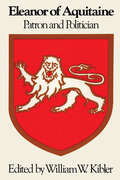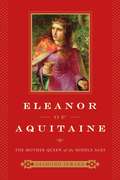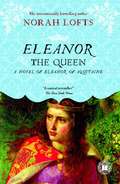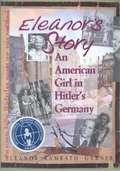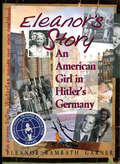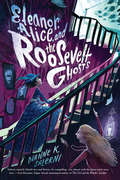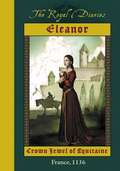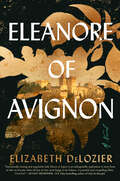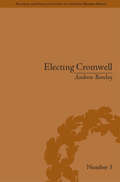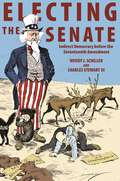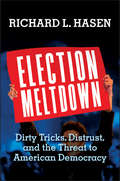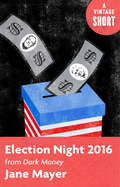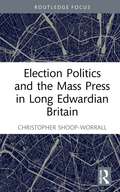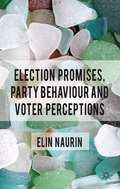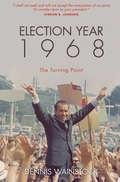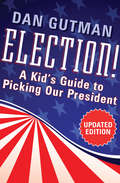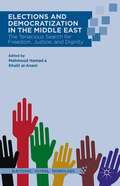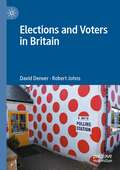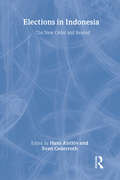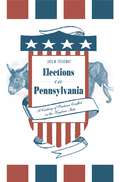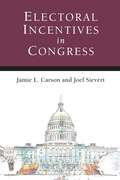- Table View
- List View
Eleanor of Aquitaine: Patron and Politician (Symposia in the Arts and the Humanities)
by William W. KiblerEleanor of Aquitaine was the wife of two kings, Louis VII of France and Henry II Plantagenet of England, and the mother of two others, Richard the Lionhearted and John Lackland. In her eventful, often stormy life, she not only influenced the course of events in the twelfth century but also encouraged remarkable advances in the literary and fine arts. In this book, experts in five disciplines—history, art history, music, French and English literature—evaluate the influence of Eleanor and her court on history and the arts. Elizabeth A. R. Brown views Eleanor as having played a significant role as parent and politician, but not as patron. Rebecca A. Baltzer takes a new look at the music of the period that was written by and for Eleanor, her court, and her family. Moshé Lazar reexamines her relationship to the courtly-love literature of the period. Eleanor S. Greenhill and Larry M. Ayres reassess her influence in the realm of art history. Rossell Hope Robbins traces the lines extending from the French courtly literature of Eleanor's period down into fourteenth-century Chaucerian England. The essays reflect divergent but generally complementary assessments of this remarkable woman's influence on her own era and on future times as well. This volume is the result of a symposium held at the University of Texas in 1973.
Eleanor of Aquitaine: Patron and Politician (Symposia in the Arts and the Humanities)
by William W. KiblerEleanor of Aquitaine was the wife of two kings, Louis VII of France and Henry II Plantagenet of England, and the mother of two others, Richard the Lionhearted and John Lackland. In her eventful, often stormy life, she not only influenced the course of events in the twelfth century but also encouraged remarkable advances in the literary and fine arts. In this book, experts in five disciplines—history, art history, music, French and English literature—evaluate the influence of Eleanor and her court on history and the arts. Elizabeth A. R. Brown views Eleanor as having played a significant role as parent and politician, but not as patron. Rebecca A. Baltzer takes a new look at the music of the period that was written by and for Eleanor, her court, and her family. Moshé Lazar reexamines her relationship to the courtly-love literature of the period. Eleanor S. Greenhill and Larry M. Ayres reassess her influence in the realm of art history. Rossell Hope Robbins traces the lines extending from the French courtly literature of Eleanor's period down into fourteenth-century Chaucerian England. The essays reflect divergent but generally complementary assessments of this remarkable woman's influence on her own era and on future times as well. This volume is the result of a symposium held at the University of Texas in 1973.
Eleanor of Aquitaine: The Mother Queen of the Middle Ages
by Desmond SewardThe dramatic story of an ambitious princess, heiress, and ruler, Eleanor of Aquitaine captures the character of this archetypal medieval queen in all of her beauty and political intrigue "A monstrous injurer of heaven and earth," as Shakespeare referred to this powerful medieval matriarch, Eleanor of Aquitaine's reign as England's stormiest and most ambitious queen has never been matched. As the greatest heiress in Europe, she was in turn Queen of France and Queen of England; among her sons were Richard the Lionheart and King John. A magnificent independent ruler in her own right, she lost her power when she married Louis VII of France. She received neither influence nor fame by her second marriage to King Henry II, who jailed her for fifteen years for conspiring and supporting their son's claim to the throne. Her husband was succeeded by their son, King Richard the Lionheart, who immediately released his mother from prison. Eleanor then acted as Regent while Richard launched the Third Crusade. Her loveliness and glamour, her throwing-off of the constraints that shackled women of the twelve century, and her very real gifts as a politician and ruler make Eleanor's story one of the most colorful of the High Middle Ages.
Eleanor the Queen
by Norah LoftsEleanor of Aquitaine rules as a modern heroine in the twelfth century, in this beloved classic of royal fiction from renowned author Norah Lofts. At a time when a woman’s value was measured solely by her wealth and the number of sons she bore, Eleanor was the high-spirited, stubborn, and intelligent heiress to the vast duchy of Aquitaine. Her leadership inspired the loyalty of her people, but she was continually doubted and silenced by the men who ruled beside her—the less wise but far more powerful men of the church and court who were unwilling to lose power to a woman, regardless of her rank or ability. Through marriages to two kings, two Crusades, and the births of ten children— including the future King Richard the Lionhearted—Eleanor solidified her place in history. InEleanor the Queen, Norah Lofts brings to life a brave and complex woman who was centuries ahead of her time.
Eleanor's Story: An American Girl In Hitler's Germany
by Eleanor Ramrath GarnerA COMPELLING AND EVOCATIVE story that immerses readers in the daily struggles of surviving World War II. Eleanor's Story is the dramatic autobiography of Eleanor Ramrath Garner's youth, growing up as an American caught in World War II Berlin. It's a story of trying to maintain stability, hope, and identity in a world of terror and contrasts. During the Great Depression, when she is nine, Eleanor's family moves from her beloved America to Germany, where her father has been offered a good job. But war breaks out as her family is crossing the Atlantic, and they cannot return to the United States. Eleanor tries to maintain her American identity as she feels herself pulled into the turbulent life roiling around her. She fervently hopes for an Allied victory, yet for years she must try to survive the Allied bombs shattering her neighborhood. Her family faces separations, bombings, hunger, the final fierce battle for Berlin, the Russian invasion, and the terrors of Soviet occupancy. This compelling story immerses us in the daily struggles of surviving World War II as a civilian. It puts a very human face on the horrors of war and helps us understand that each casualty of war is a person, not a number.
Eleanor's Story: An American Girl in Hitler's Germany
by Eleanor Ramrath GarnerAn engrossing coming-of-age autobiography of a young American caught in Nazi Germany during World War II. During the Great Depression, when Eleanor is nine, her family moves from her beloved America to Germany, from which her parents had emigrated years before and where her father has been offered a job he cannot pass up. But when war suddenly breaks out as her family is crossing the Atlantic, they realize returning to the United States isn't an option. They arrive in Berlin as enemy aliens.Eleanor tries to maintain her American identity as she feels herself pulled into the turbulent life roiling around her. She and her brother are enrolled in German schools and in Hitler's Youth (a requirement). She fervently hopes for an Allied victory, yet for years she must try to survive the Allied bombs shattering her neighborhood. Her family faces separations, bombings, hunger, the final fierce battle for Berlin, the Russian invasion, and the terrors of Soviet occupancy.This compelling story is heart-racing at times and immerses readers in a first-hand account of Nazi Germany, surviving World War II as a civilian, and immigration.
Eleanor, Alice, and the Roosevelt Ghosts
by Dianne K. SalerniMurderous ghosts and buried family secrets threaten young Eleanor and Alice Roosevelt in this thrilling middle-grade novel that puts a supernatural spin on alternate history.It's 1898 in New York City and ghosts exist among humans. When an unusual spirit takes up residence at the Roosevelt house, thirteen-year-old Eleanor and fourteen-year-old Alice are suspicious. The cousins don't get along, but they know something is not right. This ghost is more than a pesky nuisance. The authorities claim he's safe to be around, even as his mischievous behavior grows stranger and more menacing. It's almost like he wants to scare the Roosevelts out of their home - and no one seems to care!Meanwhile, Eleanor and Alice discover a dangerous ghost in the house where Alice was born and her mother died. Is someone else haunting the family? Introverted Eleanor and unruly Alice develop an unlikely friendship as they explore the family's dark, complicated history. It's up to them to destroy both ghosts and come to terms with their family's losses. Told from alternating perspectives, thrills and chills abound in Dianne K. Salerni's imaginative novel about a legendary family and the ghosts that haunt their secrets.A Junior Library Guild Gold Standard Selection
Eleanore of Avignon: A Novel
by Elizabeth DeLozierA Library Reads Pick! An Amazon Best Book of the Month!An Aardvark Book Club Pick! Rich with unforgettable characters, gorgeously drawn, and full of captivating historical drama, Eleanore of Avignon is the story of a healer who risks her life, her freedom, and everything she holds dear to protect her beloved city from the encroaching Black Death Provence, 1347. Eleanore (Elea) Blanchet is a young midwife and herbalist with remarkable skills. But as she learned the day her mother died, the most dangerous thing a woman can do is draw attention to herself. She attends patients in her home city of Avignon, spends time with her father and twin sister, gathers herbs in the surrounding woods, and dreams of the freedom to pursue her calling without fear. In a chance encounter, Elea meets Guigo de Chauliac, the enigmatic personal physician to the powerful Pope Clement, and strikes a deal with him to take her on as his apprentice. Under Chauliac&’s tutelage she hones her skills as a healer, combining her knowledge of folk medicine with anatomy, astrology, and surgical techniques. Then, two pieces of earth-shattering news: the Black Death has made landfall in Europe, and the disgraced Queen Joanna is coming to Avignon to stand trial for her husband&’s murder. She is pregnant and in need of a midwife, a role only Elea can fill. The queen&’s childbirth approaches as the plague spreads like wildfire, leaving half the city dead in its wake. The people of Avignon grow desperate for a scapegoat and a group of religious heretics launch a witch hunt, one that could cost Elea—an intelligent, talented, unwed woman—everything.
Electing Cromwell: The Making of a Politician (Political and Popular Culture in the Early Modern Period #3)
by Andrew BarclayPopular interest in Cromwell has often exceeded the originality of what has been written about him. Barclay’s study comes out of meticulous research on a huge range of newly discovered primary sources, transforming our understanding of the life and career of Oliver Cromwell during the period from his birth in 1599 until 1642.
Electing the Senate: Indirect Democracy before the Seventeenth Amendment (Princeton Studies in American Politics: Historical, International, and Comparative Perspectives #146)
by Wendy J. Schiller Charles StewartHow U.S. senators were chosen prior to the Seventeenth Amendment—and the consequences of Constitutional reformFrom 1789 to 1913, U.S. senators were not directly elected by the people—instead the Constitution mandated that they be chosen by state legislators. This radically changed in 1913, when the Seventeenth Amendment to the Constitution was ratified, giving the public a direct vote. Electing the Senate investigates the electoral connections among constituents, state legislators, political parties, and U.S. senators during the age of indirect elections. Wendy Schiller and Charles Stewart find that even though parties controlled the partisan affiliation of the winning candidate for Senate, they had much less control over the universe of candidates who competed for votes in Senate elections and the parties did not always succeed in resolving internal conflict among their rank and file. Party politics, money, and personal ambition dominated the election process, in a system originally designed to insulate the Senate from public pressure.Electing the Senate uses an original data set of all the roll call votes cast by state legislators for U.S. senators from 1871 to 1913 and all state legislators who served during this time. Newspaper and biographical accounts uncover vivid stories of the political maneuvering, corruption, and partisanship—played out by elite political actors, from elected officials, to party machine bosses, to wealthy business owners—that dominated the indirect Senate elections process. Electing the Senate raises important questions about the effectiveness of Constitutional reforms, such as the Seventeenth Amendment, that promised to produce a more responsive and accountable government.
Election Journal: The Political Events of 1987-1988
by Elizabeth DrewThe Presidential election of 1988 changed Presidential politics, in ways that will be with us for a long time. New techniques, ans a new tone, were employed, and since they were successful, they are likely to be emulated throughout our political system.
Election Meltdown: Dirty Tricks, Distrust, and the Threat to American Democracy
by Richard L. HasenFrom the nation&’s leading expert, an indispensable analysis of key threats to the integrity of the 2020 American presidential election As the 2020 presidential campaign begins to take shape, there is widespread distrust of the fairness and accuracy of American elections. In this timely and accessible book, Richard L. Hasen uses riveting stories illustrating four factors increasing the mistrust. Voter suppression has escalated as a Republican tool aimed to depress turnout of likely Democratic voters, fueling suspicion. Pockets of incompetence in election administration, often in large cities controlled by Democrats, have created an opening to claims of unfairness. Old-fashioned and new-fangled dirty tricks, including foreign and domestic misinformation campaigns via social media, threaten electoral integrity. Inflammatory rhetoric about &“stolen&” elections supercharges distrust among hardcore partisans. Taking into account how each of these threats has manifested in recent years—most notably in the 2016 and 2018 elections—Hasen offers concrete steps that need to be taken to restore trust in American elections before the democratic process is completely undermined.
Election Night 2016: From Dark Money (A Vintage Short)
by Jane MayerThe last president election was a stunning political upset when Donald Trump, a billionaire businessman won in a political coup, with no experience whatsoever. But along with this outsider, on the night of his victory, longtime conservative operator David Koch was standing, and smiling, amid a throng of revelers on the eve of November 8, 2016. In her electrifying and much-lauded, bestselling book, Jane Mayer reveals that the era of the Koch brothers and big money in American politics is far from over, despite how much discussion there is to the contrary. Rather, the secret figures behind the moneyed American oligarchy continue to wield tremendous influence over the political agendas of the Trump administration, the Republican Party today, the radical Right, and all corridors of power in Washington. A Vintage Shorts Selection. An ebook short.
Election Politics and the Mass Press in Long Edwardian Britain (Routledge Focus on Journalism Studies)
by Christopher Shoop-WorrallThis book explores the ways in which the emergence of the ‘new’ daily mass press of the late-nineteenth and early-twentieth centuries represented a hugely significant period in histories of both the British press and the British political system. Drawing on a parallel analysis of election-time newspaper content and archived political correspondence, the author argues that the ‘new dailies’ were a welcome and vibrant addition to the mass political culture that existed in Britain prior to World War One. Chapters explore the ways in which the three ‘new dailies’ – Mail, Express, and Mirror – represented political news during the four general elections of the period; how their content intersected with, and became a part of, the mass consumer culture of pre-Great War Britain; and the differing ways political parties reacted to this new press, and what those reactions said about broader political attitudes towards the worth of ‘mass’ political communication. This book will be of interest to students and scholars of media history, British popular politics, journalism history, and media studies.
Election Promises, Party Behaviour and Voter Perceptions
by Elin NaurinAn exploration of whether politicians are perceived to keep their election promises. While scholars claim that parties act on most of their election promises, citizens hold the opposite view. This 'Pledge Puzzle' guides Naurin in her analysis of the often referred to but not empirically investigated, 'conventional wisdom' about election promises.
Election Year 1968
by Dennis D. WainstockThe 1968 election saw the return of the Republican party to the White House and major changes in the political landscape. It was one of the most contentious and unpredictable contests in American history. From Lyndon Baines Johnson's exit following Eugene McCarthy's win in New Hampshire to the Robert Francis Kennedy murder, the Martin Luther King, Jr. assassination, and the Chicago Democratic Convention, it relives in this recounting of that explosive year. Vietnam was the main issue but also civil rights and George Wallace, who captured an astounding thirteen percent of the vote. The author interviewed some thirty-five politicians and players, most of them previously unpublished. Dennis D. Wainstock, PhD, is the author of Malcolm X: The Life and Times of an African-American Revolutionary, The Decision to Drop the Atomic Bomb, and Truman, MacArthur and the Korean War. He teaches history at Fairmont State University and lives in Salem, West Virginia.
Election!: A Kid's Guide to Picking Our President
by Dan GutmanA fun, funny, and informative guide to the weird world of American politics How does the president get his job? How do people know who will win an election before everybody&’s voted? Do the candidates hate each other? Dan Gutman takes on his strangest subject ever: the American political system. Reaching through history from the days of the founding fathers to today&’s voting system, Gutman tackles complex subjects in a clear, easy-to-understand way. Even grown-ups will find something in here that they&’ve never learned before. Politics are a crazy game, and with Dan Gutman teaching you the rules, you&’re going to have a blast learning how to play.
Elections and Democratization in the Middle East
by Mahmoud Hamad Khalil Al-AnaniTop scholars of the Middle East set out the history and future of elections in eight Middle East countries. Examining issues associated with elections, the transition of governance, and the ways in which technology shapes popular participation in politics and elections, they discuss the future of governance and democratic transition in the region.
Elections and Voters in Britain
by Robert Johns David DenverHow do voters in Britain decide which party to vote for in elections? Have age and education replaced class as the social basis for voting? Are elections now ‘presidentialised’, with voters simply choosing between party leaders? What role do the media, new and old, play in all of this? The authors examine these and other questions in the fourth edition of this popular text. The core of the text is devoted to examining and explaining theories of party choice, including the debate about whether voters are driven more by issues and ideology or simply by which party and leader looks least likely to make a mess of things in office. The authors also devote separate chapters to turnout trends and patterns, the media, electoral systems, the geography of party support, and – new to this edition – referendums. Fully revised and with detailed analysis of the 2019 election and the electoral fallout of Brexit, the text incorporates the latest research on elections and voting behaviour, and includes analysis of recent trends and developments – such as the effect of digital media on electoral politics and where recent misfires leave the opinion polls.
Elections in Indonesia: The New Order and Beyond
by Hans Antlöv and Sven CederrothIt has sometimes been argued that many Indonesians had little sympathy with western notions of elections being events for the contesting and transfer of power and that they rather supported the New Order's use of 'festivals of democracy', elections as occasions at which the mass of ordinary Indonesians were given the opportunity to celebrate the country's achievements under the rule of its New Order leadership as well as legitimize the continued rule of these leaders. But the need to stage-manage these 'elections' as New Order triumphs finally undid the regime. With chapters describing the last New Order election and the first free election in the post-Suharto era, this volume makes an important contribution to our understanding of the demise of the New Order, and the directions being taken by the emerging regime.
Elections in Oxford County, 1837-1875
by George EmeryElections in Oxford County, 1837-75 is a unique exploration of the forms, practices, and issues of democracy in a mid-nineteenth-century colonial setting. In this case study of thirty-eight elections in Oxford County -- first as part of the United Province of Canada, then in early Ontario -- George Emery delves into the advances, setbacks, and flaws of a partially democratic system. Emery demonstrates that while its forms and issues evolved, the net amount of democracy remained stable over time.Elections in Oxford County, 1837-75 breaks new ground with its detailed treatment of the county's voice-vote method of election, which ended with the adoption of the secret ballot in 1874. Employing an idealized parliamentary democracy as an explanatory model, Emery captures both geographically specific details and general features of this era's electoral process to enrich current understandings of nineteenth-century Canadian democracy.
Elections in Pennsylvania: A Century of Partisan Conflict in the Keystone State
by Jack M. TreadwayThe most comprehensive state election study ever undertaken, Elections in Pennsylvania provides data and analysis for more than 13,000 general elections and more than 6,000 primary elections held in the state between 1900 and 1998, with a postscript examining in less detail the elections of 2000 and 2002. Included are all elections for president, governor, U.S. senators and representatives, statewide offices, and members of the General Assembly. The extensive period of time covered allows the author to provide an important historical perspective on electoral trends, distinguishing what are genuinely new developments in electoral dynamics and voting behavior in recent decades from what are continuations of patterns earlier in the century.
Electoral Incentives in Congress (Legislative Politics And Policy Making)
by Jamie L Carson Joel SievertDavid Mayhew’s 1974 thesis on the “electoral connection” and its impact on legislative behavior is the theoretical foundation for research on the modern U.S. Congress. Mayhew contends that once in office, legislators pursue the actions that put them in the best position for reelection. The electoral connection is a post-World War II phenomenon, but legislative scholars now suggest that Mayhew’s argument applies to earlier congressional eras. To assess these claims, Carson and Sievert investigate whether earlier legislators were motivated by the same factors that influence their behavior today, especially in pursuit of reelection. They examine how electoral incentives shape legislative behavior throughout the nineteenth century by looking at patterns of turnover in Congress; the re-nomination of candidates; the roles of parties in recruiting candidates, and by extension their broader effects on candidate competition; and, finally by examining legislators’ accountability. The results have wide-ranging implications for the evolution of Congress and the development of various legislative institutions over time.
